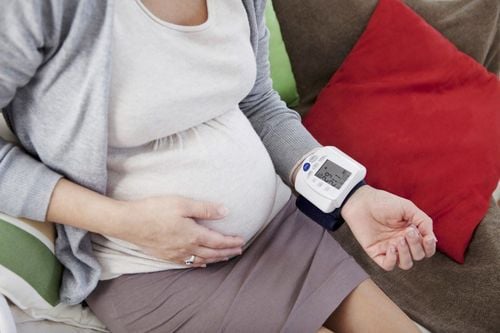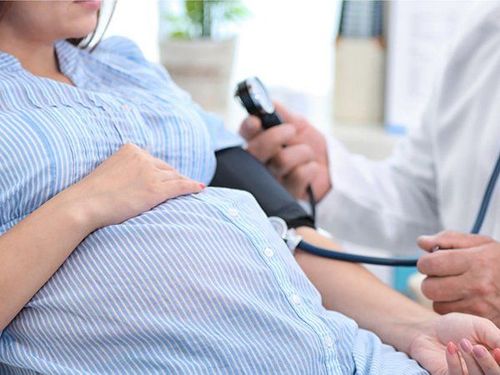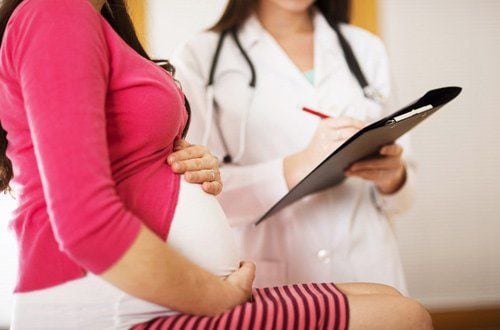This is an automatically translated article.
The article is written by MSc, Dr. Nguyen Quoc Tuan, Department of General Internal Medicine, Vinmec Times City International General Hospital
Pregnant women with changes in anatomy as well as physiology easily lead to damage in the kidney - urinary system. Kidney damage (particularly in the presence of hypertension) is a sometimes life-threatening risk factor for both mother and child. In many cases, the physical examination of pregnancy management is the opportunity to detect potential kidney disease.
1. Anatomical and physiological changes of the renal - urinary system in pregnant women
In pregnant women, the kidney increases in volume, about 1cm longer and about 4.5g heavier due to increased perfusion of renal parenchyma and interstitial tissue. Urinary system including calyx, renal pelvis and ureters on both sides are slightly dilated, especially in the right kidney. The cause of pyelonephritis is due to hormonal changes during pregnancy and because the uterus of the fetus puts pressure on the urinary system (ureters, bladder). In pregnant women in the first 3 months of pregnancy, blood pressure decreases due to a decrease in peripheral resistance, then returns to normal limits until delivery. There is also water and salt retention, plasma volume increased by 30-50% (equivalent to 1.5 liters). In contrast, the water content of the interstitial fluid increased slightly. Therefore, physiological edema is common in normal pregnant women.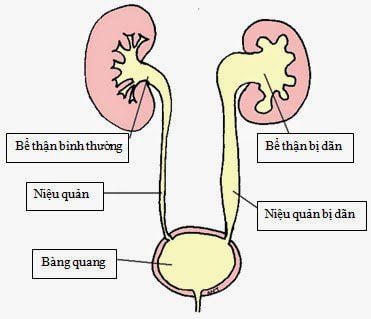
During pregnancy, the woman's kidneys are enhanced perfusion, increasing the blood flow through the kidneys by 30-50%, increasing the glomerular filtration rate (can reach 180ml/min leading to a decrease in urea, creatinine, a .uric acid in the blood Abnormal synthesis of vasoconstrictive hormones or renal cortical receptors (renin, prostaglandin ...) is believed to be the main cause of the hemodynamic changes in the kidney.
2. Kidney - Urinary pathology during pregnancy
2.1. Urinary tract infection (UTI)
About 1-2% of pregnant women have urinary tract infections including cystitis (low UTI) and acute pyelonephritis (high UTI). The favorable factor is due to slow urine flow due to dilatation and compression of the urinary system. Common types of bacteria are E.Coli, less commonly other Enterobacter species: Proteus, Klebsiella, Enterococcus, streptococcus... Urinary tract infections can lead to obstetric complications: premature delivery, stillbirth. , baby... due to blood infection.
Acute cystitis
Common clinical signs are bladder syndrome: pain under the pubis, painful urination, frequent urination, cloudy urine, difficulty urinating... There is little protein in the urine but many white blood cells (> 10). BC/mm3) and bacteria > 105/ml urine. Treatment is mainly with oral antibiotics for 7-10 days (no antibiotics of the Aminoside and Quinolone groups).

Acute pyelonephritis
Clinical signs: high fever, hip pain, bladder syndrome, may have other symptoms: abdominal pain, digestive disorders ... Subclinical need to do: transplant Blood, urine culture, urinalysis and cytology, and urinary tract ultrasound for symptoms and causes of obstruction. Treatment: is a serious complication that can affect the life of mother and child, so hospitalization is required for intravenous antibiotic treatment for 7-10 days. It is necessary to monitor for complications: bacteremia, septic shock, renal abscess, perinephritis, miscarriage, stillbirth ...
2.2. High blood pressure during pregnancy
High blood pressure during pregnancy is divided into the following categories:
High blood pressure caused by pregnancy includes preeclampsia (toxic pregnancy) and eclampsia; Chronic or pre-existing hypertension of any cause; Preeclampsia occurs in chronic hypertension.
2.2.1 High blood pressure due to pregnancy
If the blood pressure is normal before pregnancy, the blood pressure during pregnancy is above 140/90 mmHg and there is no proteinuria, it is called pregnancy-induced hypertension.
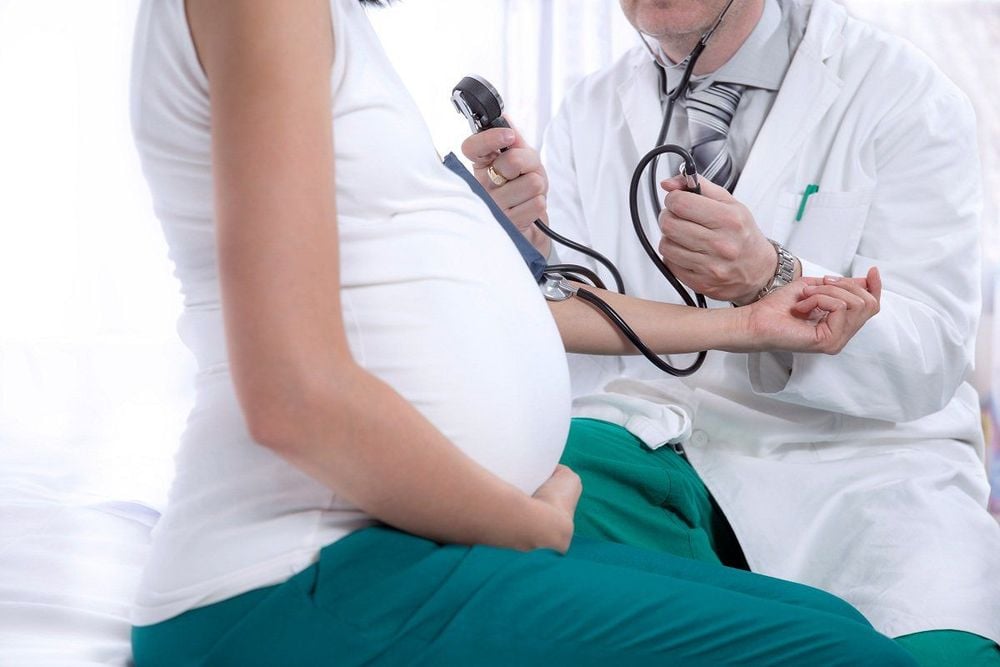
2.2.2 Preeclampsia
As one of the common kidney diseases in pregnant women, it is often related to abnormalities in the placenta such as hypoperfusion or anemia in the placenta. Predisposing factors for the occurrence of pre-eclampsia in pregnant women are: toxemia in previous pregnancies, family history of pre-eclampsia, multiple births, multiple pregnancies, and pregnancy. age, obesity, kidney disease and/or pre-existing hypertension, diabetes mellitus.
Preeclampsia is defined as hypertension (>=140/90 mmHg) with proteinuria usually occurring after the 20th week of pregnancy. In addition, the patient has edema (both face, hands, feet - different from physiological edema during pregnancy) and hyperauremia. Although a.uric is not included in the diagnostic criteria, when a.uric is >325 μmol/l, it is necessary to aim for a diagnosis of pregnancy toxicity, especially those with kidney disease or pre-existing hypertension. when proteinuria is high (urine protein/creatinine ratio >5), blood pressure >= 160/110 mmHg. Usually, the symptoms of UTI usually disappear after a few days to a few weeks, there are rare cases of proteinuria lasting up to 6 months (if proteinuria persists for more than 6 months, kidney biopsy is required to determine the cause). ). However, UTI can progress to severe complications with serious complications for the mother (eclampsia, HELLP syndrome, acute renal failure, placental abruption, placental hematoma) and the baby (fetal shrinkage, stillbirth).
Treatment is mainly to closely monitor disease progression (especially blood pressure and proteinuria), rest, control blood pressure, give antiplatelet drugs (Aspirin).
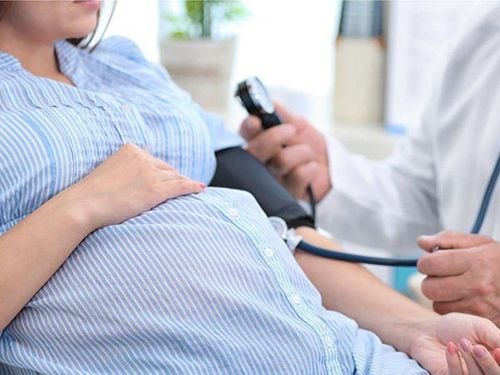
2.2.3.Eclampsia
Is a severe and sudden complication of UTI. Signs: blood pressure > 160/110 mmHg, urine protein/creatinine ratio >5, oliguria < 500 ml/24 hours, rapid acute renal failure, visual disturbances, severe headache, thrombocytopenia, hematuria glomerulonephritis, the mother convulsions all over the body, then falls into a coma. It is necessary to treat emergency with anticonvulsant drugs (Diazepam, Magne Sulfate), intravenous antihypertensive drugs, ensure respiratory and circulatory function (intubation, mechanical ventilation, intravenous fluids ...) and quickly cesarean section in time to save both mother and child.
2.2.4 Hemolysis Elevated Liver enzymes Low Platelet count (HELLP) syndrome
Although rare, this is one of the very serious complications of UTI. Pathology related to maternal vascular lesions. On the background of UTI, the patient appeared hemolysis, increased liver enzymes, decreased platelet count, very rarely, bleeding under the liver, even liver rupture. Rapid disease progression leads to acute renal failure.
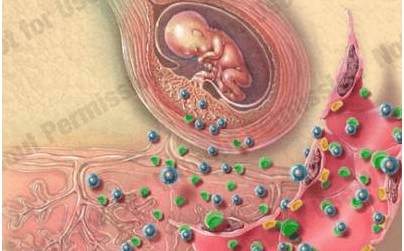
2.3.Acute kidney injury (acute kidney failure) in pregnant women
Usually occurs from the 35th week of pregnancy until before, during and after delivery. A Clinically the patient has oligouria or anuria, anorexia, nausea or vomiting. Laboratory tests: blood urea and creatinine increased, electrolyte disturbances and acid-base balance.
2.4.Pre-existing kidney diseases
Such as chronic glomerulonephritis, chronic pyelonephritis, systemic lupus erythematosus, diabetic glomerulonephritis, hypertensive nephropathy.. often worsen during pregnancy or directly affect health of the mother as well as the fetus (prone to UTI).
Pregnant women have many factors that can lead to pathologies in the urinary system, sometimes life-threatening for both mother and baby. However, if detected early and closely monitored, serious complications can be controlled or prevented, so the role of regular antenatal check-up with blood pressure measurement, urine test for proteinuria, and uric acid quantification blood, fetal ultrasound... are very important. People with chronic kidney disease can still become pregnant and give birth, but need to consult a doctor before deciding to become pregnant and closely monitor pregnancy.
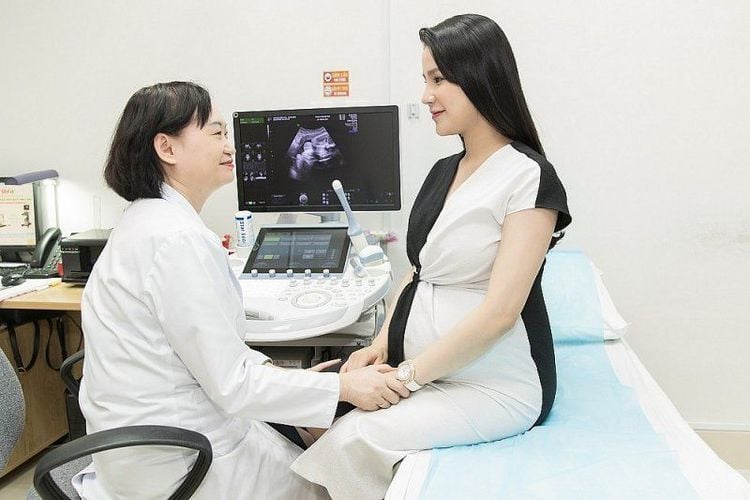
To protect the health of pregnant women and their babies during pregnancy, Vinmec International General Hospital provides a package of maternity services as a solution to help pregnant women feel secure because of the companionship of the medical team. doctor throughout pregnancy. When choosing Maternity Package, pregnant women can:
The pregnancy process is monitored by a team of highly qualified doctors Regular check-ups, early detection of abnormalities The Package Maternity package helps to facilitate convenient for the birthing process Newborns get comprehensive care
Please dial HOTLINE for more information or register for an appointment HERE. Download MyVinmec app to make appointments faster and to manage your bookings easily.





